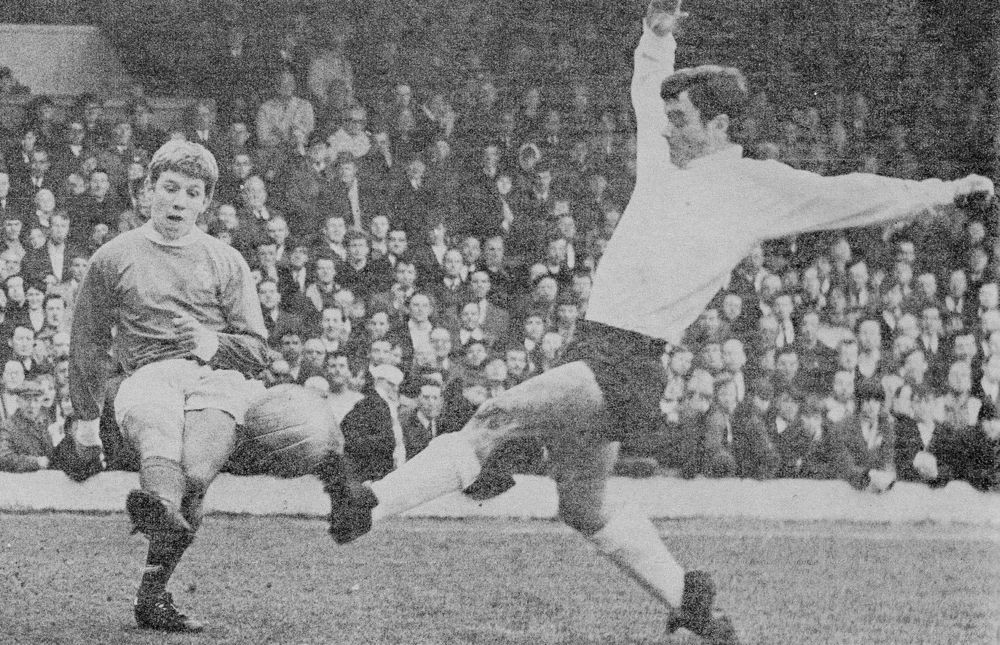
John Kiers (right)
John Kiers was a rugged Scottish-born defender who began his career with Annbank before being signed by Charlton Athletic in June 1965 after being spotted playing for a Cumnock select side.
He made his debut for the Addicks at the end of the 1965/66 season and went on to make 85 first team appearances before being transferred to South African side Cape Town City in January 1971.
He spent two years there and then had a brief spell with Stevenage before moving to Tonbridge for the 1973/74 season.
And despite being a defender, he ended up as the Angels` leading marksman in 1974/75, scoring a remarkable 18 goals.
He remained at Longmead until the summer of 1976 when he linked up with Weymouth.
At the end of January 1977, he joined Margate on a month’s trial and at the time was the Terras` leading scorer with 10 goals!
Margate wanted to sign him but couldn’t afford the fee that Weymouth were asking, and, in the summer of 1977, he signed for Maidstone United but in March 1978, he moved to Folkestone & Shepway as a replacement for Neil Cugley.
He then moved on to Gravesend & Northfleet for the 1978/79 season and totalled 85 appearances for Fleet, scoring 6 goals, before re-joining Tonbridge for the 1980/81 campaign.
He stayed with Angels for almost five years and became their player-manager in December 1982 until the end of the 1984/85 season.
He sadly passed away in December 1995, aged only 48.
Brian Lawrence was born in Upton, Poole.
He started playing football at Hamworthy United in 1969 and represented Dorset at both schools and youth level.
He moved to Bournemouth, but did not quite make the breakthrough, moving to Weymouth in July 1973, making his debut against Barnet in August 1973.
Whilst at Weymouth he was selected for the FA Representative XI in 1979/80.
He was awarded two testimonials, the first against Chelsea in 1979 and another against Southampton in 1985.
It is remarkable that Lawrence can boast two runs in which he played over a 100 consecutive games for the Terras. These came between 11th August 1973 and 16th April 1975 (128 games) and April 1976 to April 1978 (125 games).
He also captained the club on 80 occasions and is the only player to make 150 first team appearances before his 21st birthday and is the youngest player to make 500 appearances, which he achieved at 26 years 11 months.
He was released by Weymouth in May 1985, moving to Poole Town, having made 666 appearances (26 as a sub) and scoring 6 times.
As a Dolphin he made 50 appearances, scoring once, before retiring in June 1987.
He has since spent time helping at Swanage, in youth and senior football.
Goalkeeper John Morton began his career with Gillingham and also had a spell with Kent League side Chatham Town before signing for Southern League outfit Dartford in February 1969.
He joined Margate on loan in February 1970 before going on to spend several more seasons with the Darts, recovering from a career-threatening knee ligament injury to make over 250 appearances for them.
During 1972/73 he was selected to represent Kent and was in goal when Dartford lost 2-1 to Morecambe in the 1974 FA Trophy Final at Wembley.
He finally left Dartford to join Wealdstone for the 1974/75 campaign and stayed with the Stones until 1977 but was said to struggle in games played under floodlights due to the fact that he wore contact lenses!
He later spent several seasons in the Southern League with Hounslow before moving to Hayes in 1980.
Brian Owen will probably go down in FA Cup history for scoring a famous goal that few remember!
That’s because he scored the `other` goal in Hereford United’s historic win over Newcastle United remembered mostly for Ronnie Radford’s `rocket`.
The centre-forward was one of the game’s `grafters` but who was also a very capable finisher.
Apart from helping Hereford into the Football League and playing in the old Fourth Division, he went on to spend from 1973 until 1976 with Weymouth back in the Southern League, making over 80 appearances and scoring 15 goals.
After finishing with football, Owen worked in the building trade before retiring to Padstow in Cornwall.
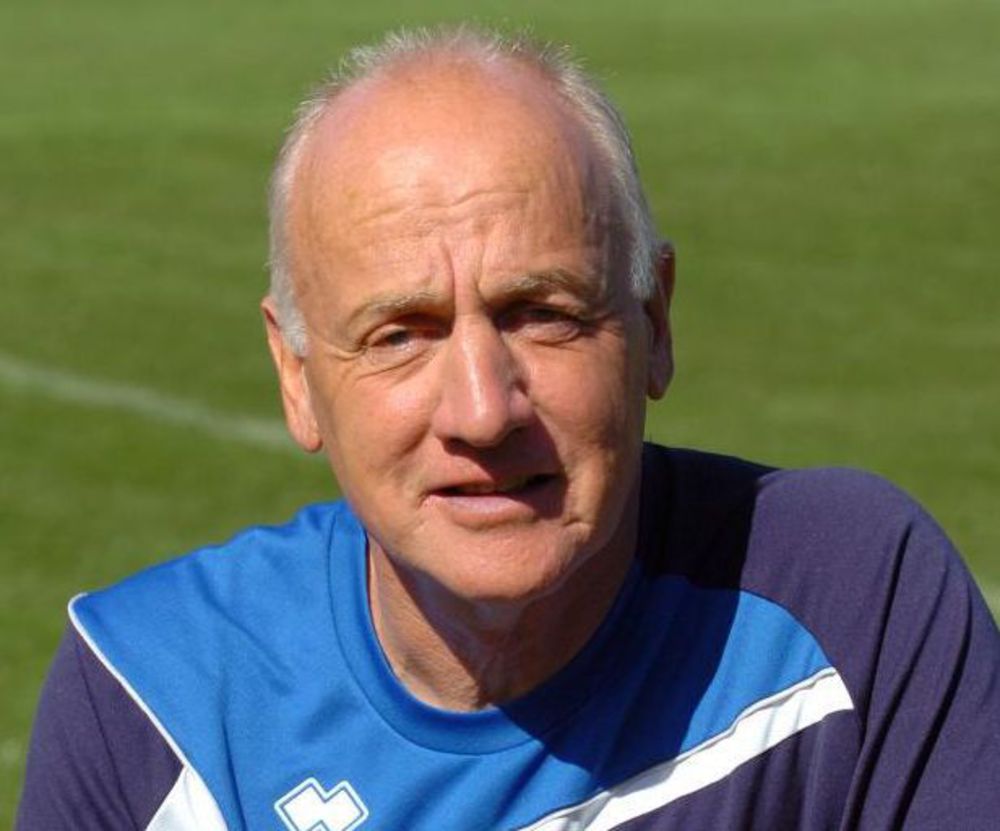
Vic Bragg
Vic Bragg has made a name for himself in coaching for many years in the Sussex area.
Since 1994, he has been a professional development coach, working out of a training ground in Lancing, West Sussex.
He has held various roles at Brighton & Hove Albion and Crawley Town, from centre of excellence manager, head of coaching, under-18 and under-23 manager and has been the assistant manager of the England under-16 side and was assistant manager of the England Schoolboys.
As a player, Bragg was a defender who started his career with Fulham.
He signed for Crawley in 1968 and helped the club to promotion to the Southern Premier Division and then moved to Horsham in 1975 before returning to the Reds a couple of years later.
Stayed until 1983 and totalled over 600 games for the club.
A former England Youth international winger, Dave Dodson signed professional for Arsenal in November 1957.
He failed to secure a first-team slot at Highbury and joined Swansea Town in July 1959.
He made his League debut in the following month's 2-1 victory at home to Lincoln City and netted 11 goals in 30 Second Division games and scored in Swansea's 1960 West Wales Senior Cup final success.
He was then sold to Portsmouth for £4,000 in December 1961.
Helping them clinch the Third Division title that season, he joined Aldershot in January 1965.
He subsequently played in the Southern League for Hereford United, Guildford City, in the Western League with Andover and the Hampshire League for Fleet Town.
Carl Gilbert was a tall, stylish striker, born in Folkestone, who began his career with Gillingham in 1965, joining from the army in 1965 and top scored for the reserves in his first two seasons at Priestfield.
During the 1967/68 campaign, he broke into the Gills` first team and marked his full debut with a goal in a 2-1 win over Mansfield Town at Priestfield.
He went on to make a total of 30 first team appearances for the Gills, spanning three seasons, and scored 11 goals.
In December 1969 he was transferred to Bristol Rovers and scored 18 times in 53 appearances during the 69/70 and 70/71 seasons.
In March 1971, Rotherham United paid £17,000 to take him to Millmoor and he went on to make 108 appearances for the Millers, scoring 44 goals, including all four in a 4-0 home win over Swansea in September 1971.
He subsequently joined Southern League Margate in July 1974 for a £2,500 fee – a club record at the time.
He repaid that fee by playing 64 games and scoring 23 goals before being sold to Folkestone & Shepway in January 1977 for a £300 fee.
In the summer of 1978, he became Folkestone’s player-coach and spent five years with his home-town club before joining Canterbury City early in 1982.
During the remainder of the 1981/82 season, he scored 6 goals in 16 Southern League games but in the summer of 1982, he moved onto Kent Leaguers Herne Bay.
After a short spell as Herne Bay’s player-manager, Gilbert returned to Canterbury for the 1983/84 campaign and scored 6 goals in 32 games.
In the summer of 1985, he took over from Alf Bentley as Canterbury’s manager, but he resigned during the 1986/87 season and returned to Folkestone as assistant manager/coach.
He later went on to manage Folkestone and even made a handful of substitute appearances in 88/89 at the age of 40 before he resigned in February 1990.
However, Gilbert once again took charge of Folkestone early in 1990/91 – again taking over from Alf Bentley but quit in December 1990.
Geoff Truett was a forward born in Forest Gate, Essex before being evacuated to Amersham, Buckinghamshire during World War Two
As a youth he was involved in athletics, competing in the shot put and javelin and began playing for Wycombe Wanderers alongside brother Jim, scoring
63 goals in 114 appearances in all competitions between 1952 and 1957.
While playing with Wycombe, Truett won the Isthmian League in 1956 and 1957 and was a runner-up when he played in the 1957 FA Amateur Cup Final against Bishop Auckland at Wembley in front of 90,000 spectators.
As in the Amateur Cup semi-final of 1955, Wycombe couldn’t topple the Bishops, who won 3-1.
Following interest from a number of professional clubs, Truett was a member of the London XI team which played in Switzerland in 1957.
He then played in the Football League for Crystal Palace, scoring 5 goals in 38 appearances between 1957 and 1962.
He later played in the Southern League for Tonbridge between 1962 and 1970, remaining the player with the record number of starts, with 517 in all competitions - the only player to have more appearances was Mark Gillham.
While playing with Tonbridge, Truett won the 1965 Kent Senior Cup, and he was twice voted as the club’s player of the year.
Remarkably, his benefit match in March 1968 attracted a complaint from the Lords Day Observance Society as it was played on a Sunday!
Truett finished his career with Hastings United, retiring in 1973 at the age of 38.
He combined his semi-professional playing career with working as a builder.
After retiring as a player Truett worked as a buyer for a number of building firms in the Croydon area.
He died in January 2015, aged 79, following a short illness.
Joe Carolan was a Dublin-born full back who started his career with Home Farm at youth level before moving to Manchester United in February 1956, where he featured in their FA Youth Cup winning team.
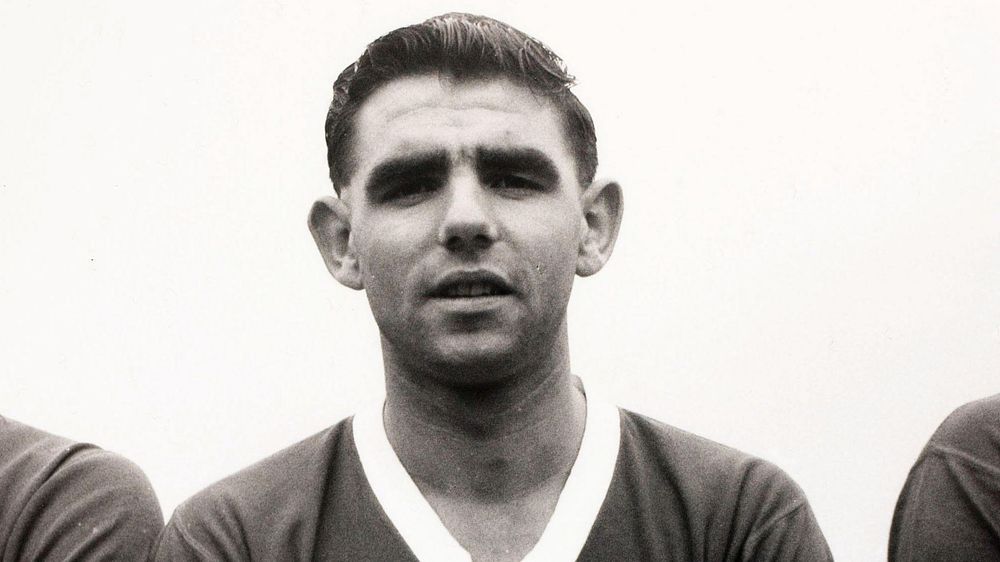
Joe Carolan
He broke into the first team nine months after the Munich air disaster, which had claimed the lives of eight United players – including his fellow countryman Bill Whelan and resulted in two other players being injured to such an extent that they never played again.
In November 1958, Carolan made a winning senior debut as United beat Luton Town 2-1 in front of more than 42,000 fans.
That season Carolan went on to make a total of 23 League appearances as well as one appearance in the FA Cup.
It wasn’t until his twelfth league appearance before Carolan tasted defeat when Arsenal beat United 3-2 at Highbury.
He began the 1960/61 season in the Manchester United team in the first two matches against Blackburn and Everton.
Following two defeats, 7 goals conceded and just one scored, manager Matt Busby decided to ring the changes.
Carolan was dropped from the first team and never regained his place except for one League Cup match.
He played his last match for United in October 1960 against Exeter City at
Old Trafford. United won the tie 4-1 with fellow Irishman John Giles scoring one of the goals.
When Matt Busby signed another Irish defender, Noel Cantwell from West Ham United, the writing was on the wall for Carolan.
In December 1960, Carolan left United and signed for Brighton & Hove Albion.
He played 71 times for United between 1958 and1960 and won two caps for the Republic of Ireland, making his debut in November 1959 in a 3-2 friendly win over Sweden at Dalymount Park.
Carolan’s second and last appearance for the Republic of Ireland was once again in a friendly match at Dalymount with the Republic beating Chile
2-0.
His Brighton stay lasted two years, making 33 appearances before joining Southern League Tonbridge in 1962.
He stayed at the Angel Ground until 1968 making 424 appearances and scoring 50 goals before signing for Canterbury City in 1968.
He returned to Tonbridge as manager in January 1970, succeeding John Smith who had ended his second spell in the hot seat.
Carolan held the position for 14 months before being succeeded by Billy Newman in March 1971.
His two sons, Ian and Neil both represented the club with Ian making 123 appearances, scoring 5 goals and Neil 69 appearances with one goal.
Joe Carolan died in September 2018, aged 81.
John Leedham was a Carshalton-born wing half.
He started his career with then-Corinthian League side Epsom & Ewell before being signed by Walsall in October 1962.
He moved to Millwall in May 1964 until August 1965 when he joined Leyton Orient.
A short spell with Dartford preceded a 1968 move to Crawley Town where he went on to make 577 appearances.
Winger Norman Golding started his career with Wimbledon in the Isthmian League, making his senior debut in the 1954/55 season.
He then moved to Crystal Palace where he spent the 1957/58 campaign before joining Southern League Dartford in the summer of 1958.
Later in the 58/59 campaign, Golding joined Tonbridge before being signed by Queens Park Rangers in August 1959.
He went on to make 31 appearances for the Rs during 59/60 and 60/61 and scored 6 goals.
After being released by the Hoops, he signed for Southern League Kettering Town where he spent the 1961/62 season.
Playing alongside former England stars Jack Froggatt and Johnny Morris and a fledgling John Ritchie, Golding helped the Poppies to a great FA Cup run which included a win over Swindon Town before losing to county rivals Northampton Town in front of 18.825 at the old County Ground.
In the summer of 1962, Golding returned south and joined Gravesend & Northfleet and then had spells with Yiewsley and Margate before ending his playing days with Cray Wanderers.
He helped the Wands to win the Greater London League title and became player-manager in 1966 before quitting at the end of the 1969/70 season when he retired from football to run a pub and worked in the industry for 35 years.
He sadly passed away in July 2014.
In 1939 prior to the outbreak of war, he volunteered for the Army and was posted to the Grenadier Guards, for whom he played as an outside left.
During season 1944, while playing for Ashton National, he sustained concussion and when in hospital was approached by Ted Goodier, manager of Rochdale and he signed professional forms for them.
After only three months with Rochdale, he was signed by Manchester City and, in his first season at Maine Road made 30 first team appearances
and scored 26 goals.
In 1946/47, City gained promotion to the First Division. After he had scored
16 goals, Constantine had the misfortune to break an ankle and did not play for them again.
He was, of course, awarded a League championship medal for his part in the promotion battle.
In 1947 he was signed by Bury but stayed for only one season, during which he scored 17 goals, some of which were obtained from the inside-right position.
During the summer of 1948, he was signed by Millwall and played for the Lions for four seasons.
The followers of the Millwall club soon made Constantine their idol, and when Charles Hewitt, who was manager at the time, decided to place him on the open transfer list, he lost the club thousands of supporters. Their loss was, however, Southern League Tonbridge’s gain and his record while he was a regular player for Angels – 105 goals in 131 games – speaks for itself.
He passed away in 1998 after suffering from stomach cancer.
Ray Ames was an exciting winger who went on to become a great favourite with Poole Town supporters.
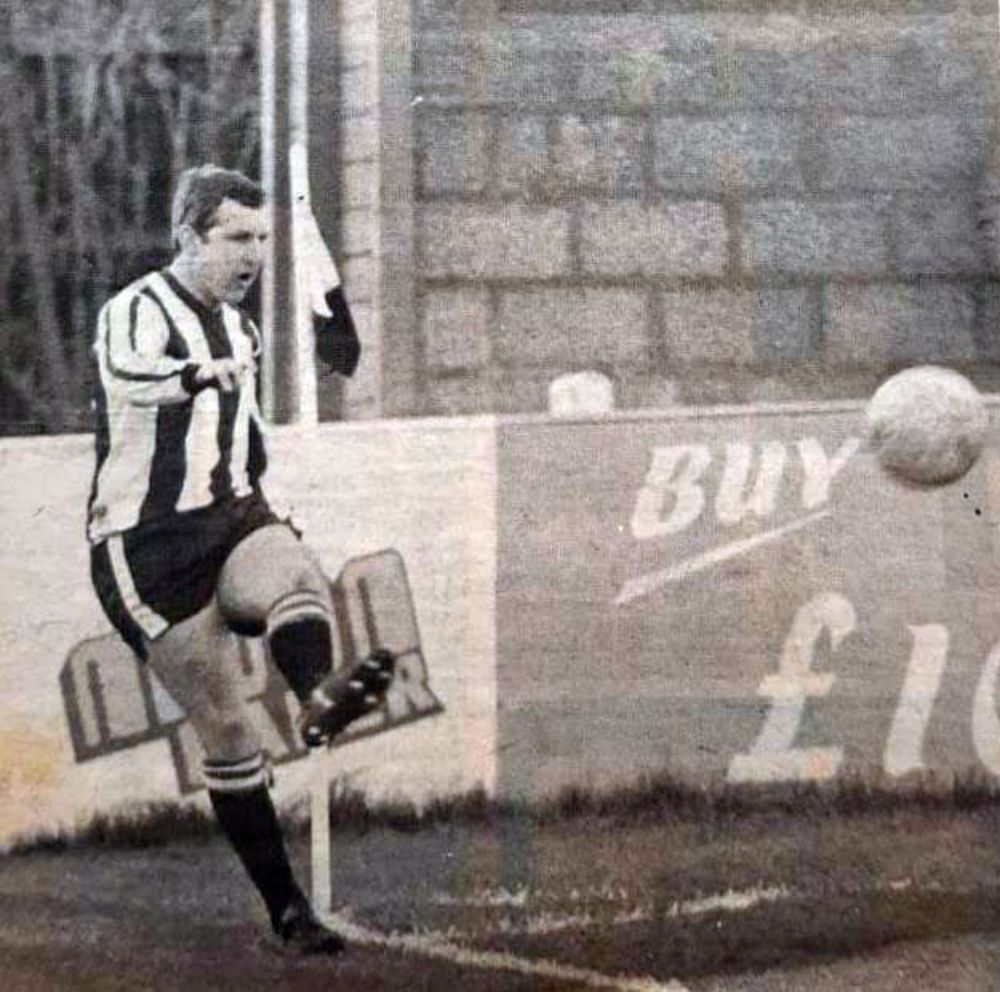
Ray Ames
A tenacious player with a very accurate left foot, he was also a consistent goalscorer.
He began his career with Southampton and was on the fringes of the first team in the old First Division before being released.
He moved along the coast to Poole from Weymouth in 1972 after spending two years with the Terras, scoring 10 goals in 52 matches.
He moved inland to sign for Dorchester Town in 1979 and helped the Magpies to win the Southern South Division in his first season there.
He sadly died of cancer in 2012 at the age of just 60.
Terry Collins was a former Swansea Town junior.
The inside forward joined Southern League Division One outfit Barry Town in July 1961 and helped them win the South Wales Senior Cup on his debut.
He moved to Hereford United in July 1964 and was a Southern League Division One promotion winner in 1964/65.
H then had spells with Haverfordwest County and Ton Pentre before re-joining Swansea in March 1967.
His only Football League appearance was in the following month's 1-0 win at home to Aldershot and he returned to Haverfordwest in July 1968.
He later played for Merthyr Tydfil in the Southern League and managed Abercynon in the Welsh League.
Roger Fry started his playing days with local side Vospers when Southampton scouts spotted his abilities as a goalscoring left-sided winger.
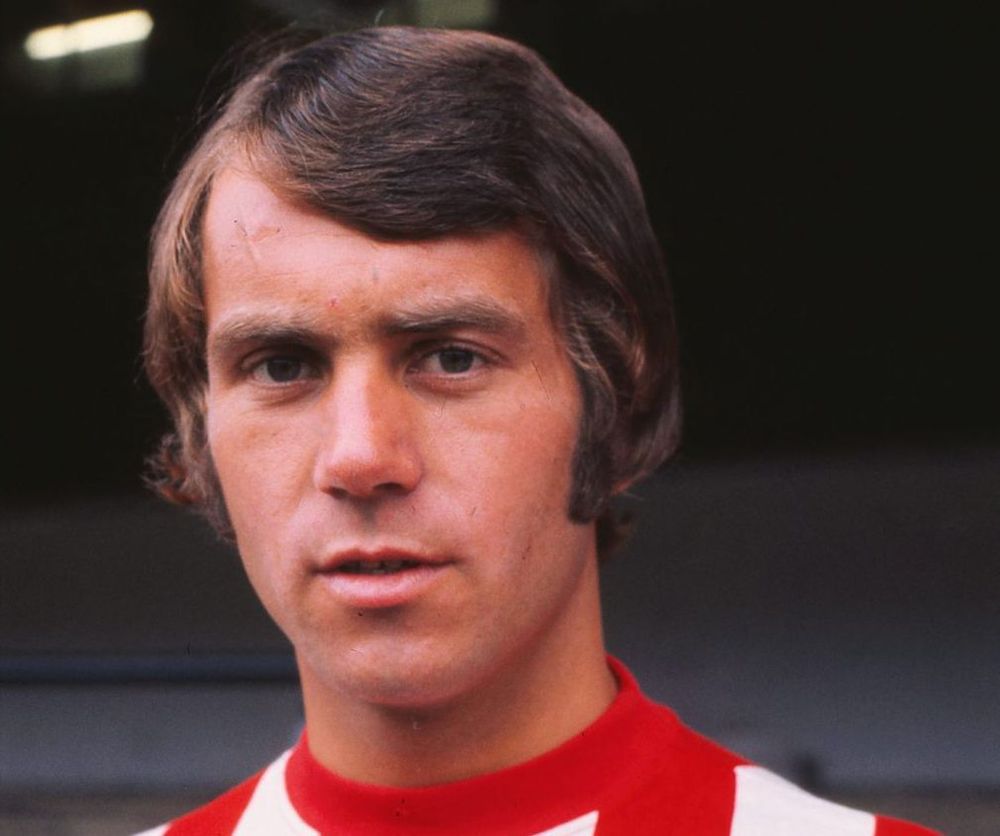
Roger Fry
Signing as a professional at The Dell at 19, he developed into a full-back.
After three seasons of reserve football, he came in for the final game of the 1970/71 season.
Competition for the left-back berth was fierce, so Fry never really enjoyed an extended run.
However, one memorable game he perhaps he had wished he hadn’t featured in was the infamous 7-0 humiliation by Leeds United shown on Match of the Day.
After another season of niggly injuries and reserves football, Fry reluctantly requested a transfer and duly moved to Walsall – he had played 23 first team games for the Saints.
He played 136 games over four seasons with the Saddlers, before the legendary Dave Mackay handed him a free transfer in 1977.
He returned home to Southampton for three enjoyable seasons with Salisbury City in the Southern League, winding up his career with North Baddesley and turning out for the ex-Saints into his 50s.
He switched from plumbing to production planning at Vospers and then worked in a similar capacity at the various incarnations of Aerostructures for the next 20 years and counting, while remaining a Saints fan and season-ticket holder.

Most clubs are looking for volunteers. Find out more on the button below:
www.PitchingInVolunteers.co.ukAll the news and results in one place.
REGISTER